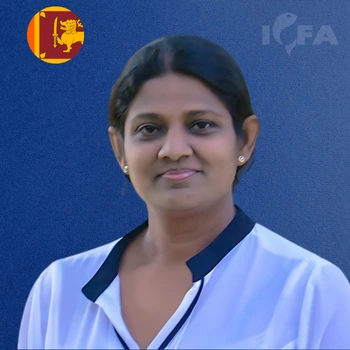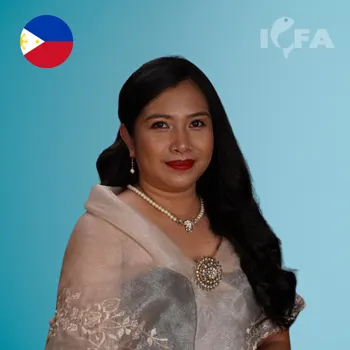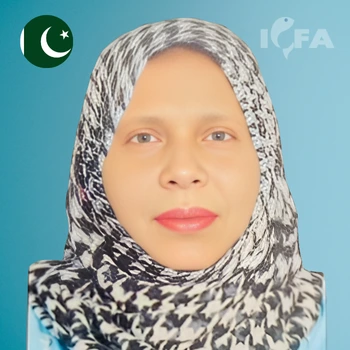
Senior Lecturer,
Department of Agricultural Economics and Agribusiness,
Faculty of Agriculture,
University of Ruhuna,
Sri Lanka
Dr. Dilanthi Koralagama is a senior lecturer in the Department of Agricultural Economics and Agribusiness at the University of Ruhuna, Sri Lanka. With a Doctor of Philosophy degree, she has made significant contributions to research in areas such as fisheries economics, gender studies, well-being, inclusive development, and climate change. Her work focuses on sustainable development, rural development, agricultural extension, and fisheries management, often utilizing participatory rural appraisal techniques. Dr. Koralagama has authored numerous publications and supervised several postgraduate theses, including research on socio-economic analysis of dried fish producers and the impact of work-family conflict on university lecturers’ performance. Her expertise and commitment to advancing agricultural economics make her a valuable asset to the academic community at the University of Ruhuna.
Topic Overview:
This topic explores the vital process of transforming fisheries data into actionable insights that inform policy development. Fisheries observations, ranging from fish stock assessments to environmental factors and fishing practices, provide a rich source of information that can drive sustainable fisheries management. However, for this data to have an impact, it must be properly interpreted, analyzed, and translated into policies that balance ecological preservation with economic interests.
Key Takeaways:

Institute of Science, Kolehiyo ng Lungsod ng Dasmariñas, Philippines.
Patrique Erika A. Cancel is an Associate Professor II at Kolehiyo ng Lungsod ng Dasmariñas, where she serves as Program Chair for BS Life Sciences. She holds an MS in Biology from Cavite State University and has undertaken PhD studies in Educational Management. Her research focuses on environmental science, microbiology, and science education, with notable studies on microplastic pollution in aquatic ecosystems. She has presented her findings at international conferences and received recognition for her work, including the Best Paper Award at the Cavite State University 2024 Student Research Symposium. An advocate for science outreach, she has led community projects on marine conservation and environmental education.
Topic Overview:
“Writing for Policy-Impact: Translating Research into Public Engagement” focuses on how researchers can communicate their findings to influence public policy. It highlights the importance of simplifying complex research into clear, actionable recommendations for policymakers and the public. Researchers are encouraged to use accessible language and public engagement strategies like media outreach and advocacy. The session covers crafting policy briefs, op-eds, and reports that resonate with non-experts to ensure research leads to tangible policy changes. Ultimately, it empowers researchers to make a significant impact through effective communication.
Key Takeaways:

Professor, Department of Zoology, Govt. Graduate College of Science, Lahore, Pakistan
Dr. Asma Karim is a Professor of Zoology based in Lahore, Pakistan, with over 27 years of experience in research, teaching, and academic leadership. She holds a Ph.D. in Zoology from GC University, Lahore, specializing in Fisheries, Molecular Biology, Fish Immunology, and DNA Barcoding. Dr. Karim has published over 30 papers in HEC-recognized and impact-factor journals, focusing on genetic diversity, fish immunology, and environmental toxicology. She has presented her research at international conferences across several countries, including Dubai, Sri Lanka, and Hungary.
In addition to her research contributions, Dr. Karim has supervised over 25 M.Sc. and M.Phil. students and has played a key role in curriculum development. She is actively involved in scientific collaborations and training programs aimed at advancing sustainable fisheries and environmental conservation. Through her work, she continues to make a meaningful impact on both national and international research communities.
Topic Overview:
“Designing Publishable Research in Fisheries and Aquaculture: From Hypothesis to Journal” outlines a step-by-step approach to conducting and publishing high-quality research in the field of fisheries and aquaculture. It guides researchers on how to develop research questions, design experiments, analyze data, and prepare manuscripts for submission to peer-reviewed journals.
Key Takeaways:
“Blue Futures Through the Lens: Capturing Sustainability, Innovation, and Community in Aquatic Systems”

Submission Guidelines



4th of July 2025
The Aqua Q&A session at the 12th International Conference on Fisheries and Aquaculture (ICFA) 2025 offers a unique platform for researchers, policymakers, and industry representatives to engage in open discussions on fisheries and aquaculture. This interactive one-hour session is designed to facilitate the exchange of ideas, address challenges, and explore future developments within the sector. By bringing together these three key stakeholder groups, the Aqua Q&A fosters collaborative problem-solving and the co-creation of innovative solutions, aligning with ICFA 2025’s commitment to advancing global aquatic excellence.

17th September 2025 | 16.15 -17.15 (Tentative Time Slot for the Session)
The Partner Collaboration Space offers a dedicated platform for both international and Vietnam partners to collaborate, network, and engage in meaningful discussions. This one-hour session is designed for decision-makers from various partner organizations to connect, share ideas, and explore potential collaborations. It serves as a hub for clear and productive communication, helping to foster strategic partnerships and drive collective progress in the aquaculture sector.

16th September 2025 | 11.20-12.20 (Tentative Time Slot for the Session)
The Field Trip is an exclusive opportunity for international participants who wish to extend their experience after the conference by visiting key locations in Nha Trang, Vietnam. Known for its significance in the fisheries and aquaculture industries, Nha Trang offers a unique chance to explore industrial farms that utilize some of the best technologies and techniques in the world.
Vietnam’s fisheries and aquaculture sector stands out for its innovative seeding, breeding, and nutrient processes, making this field trip an exciting and highly informative experience. Participants will have the chance to witness firsthand the practices and technologies driving the future of the industry. Don’t miss this chance to enhance your knowledge and experience Vietnam’s cutting-edge aquaculture practices!

Important Note: Please register in advance via the provided form to secure your spot and obtain permission for the field visit.
The “Insight to Impact” Focus Group Discussion is a unique and invaluable feature of ICFA 2025, designed to provide a platform for participants aiming to maximize the impact of their research and foster collaborations. This session offers an opportunity to discuss challenges, share insights, and explore solutions related to fisheries, aquaculture, and sustainable practices. Participants will have the chance to engage in dynamic conversations that bridge research and real-world applications, driving meaningful advancements in the aquaculture sector.
Purpose of the Segment:
Key Benefits of Attending:
Focus Group Discussion Themes
Imagine a world where collaboration drives impact, where knowledge transforms communities, and where your expertise creates lasting change. The TIIKM Synergy Hub is a global platform dedicated to fostering innovation, professional growth, and interdisciplinary solutions. As a multidisciplinary network, the Synergy Hub brings together professionals from diverse fields to drive meaningful initiatives. By joining forces, we tackle real-world challenges, implement community-driven solutions, and build a sustainable future through knowledge sharing, mentorship, advocacy, and collaboration.
The TIIKM Synergy Hub is calling leaders, professionals, and volunteers to be part of this global movement. Your expertise, passion, and commitment can make a difference!
Lead initiatives in your region and drive impactful projects.
Build networks, implement projects, and engage communities at the national level.
Contribute your time and skills to support meaningful initiatives.